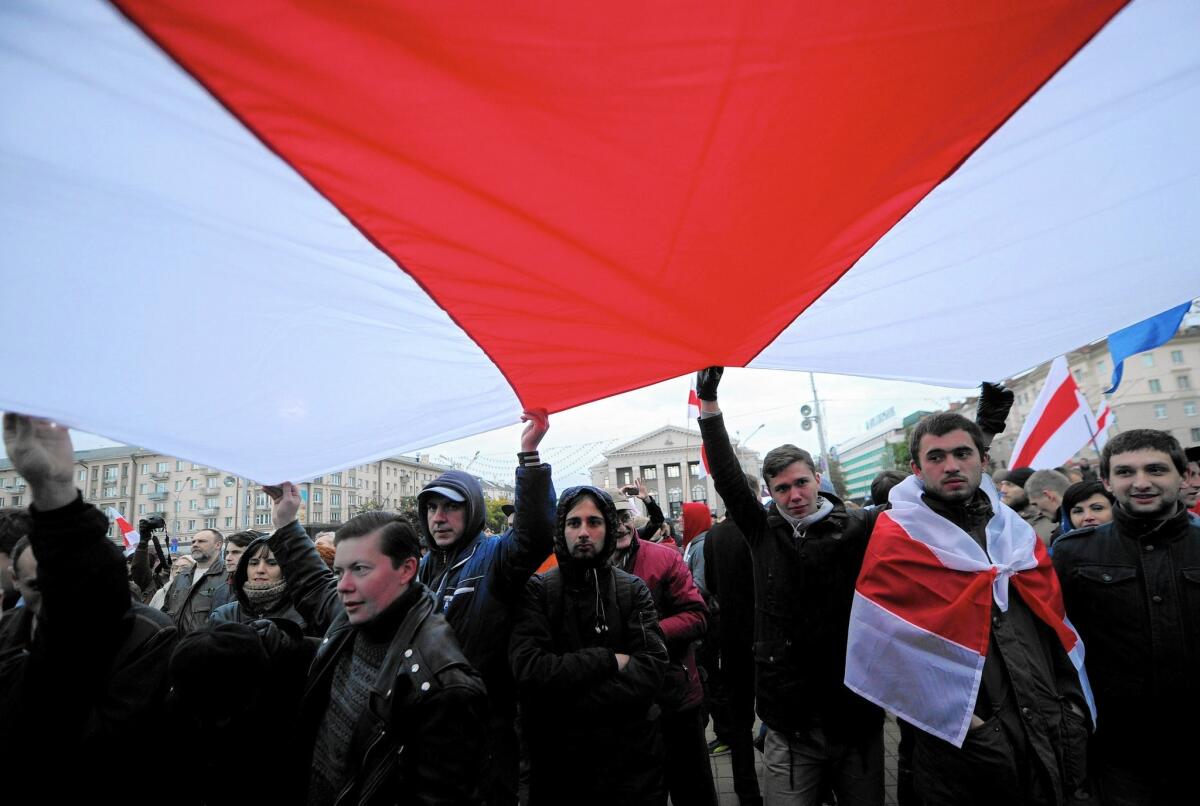Belarus election: Alexander Lukashenko will win, but by how much?

- Share via
Reporting from Minsk, Belarus — There’s no real mystery as to who will win the presidential election here Sunday.
President Alexander Lukashenko has ruled over this post-Soviet nation for more than two decades, and his reelection for a fifth term is all but guaranteed, thanks to his iron grip on everything from the state-run economy to the rubber-stamp parliament.
The real question is who will win the smartphone.
A week ago, an opposition group called Movement for Freedom set up an online game seeking predictions on the percentage of the vote that ballot officials will announce Lukashenko has received compared with the three other candidates. The winner is to receive a new Samsung Galaxy Grand Prime phone.
Within hours, hundreds had registered their guesses. The average guess was 73% for the 21-year president. Previous elections have seen him get nearly 80% in elections that international observers have declared “flawed.”
“We all know it’s just a number the president orders the election commissioner to announce,” said Yuri Hubarevich, creator of the contest and the first deputy chairman of Movement for Freedom.
The game spotlights the prevailing sense of pessimism among West-leaning groups here about Belarus’ ability to finally shake Lukashenko’s authoritarian rule.
Western countries, including the United Sates, have long demanded that Lukashenko follow international laws on human rights and ease his control over the economy. Yet Belarus remains ensconced in a Soviet-era time warp.
Stalinist architecture still dominates the landscape of the capital’s tidy streets. Media are controlled by the state, and independent outlets are silenced. Political opponents are jailed or simply disappear.
The state security agency continues to be called the KGB, and still has the ability to call in people at random for questioning about perceived antigovernment activities, such as promoting the use of the Belarusian language.
Unlike other former Soviet republics, including Russia, Belarus never renamed streets such as Karl Marx, Engels, or Lenin, nor did the country tear down the huge Soviet realism statues dedicated to the heroes of communism. A large bust of Felix Dzerzhinsky, the founder of the Soviet secret police, still stands in a tidy, grassy boulevard just off Minsk’s main drag.
Nearly 80% of the country’s economy consists of state-owned enterprises, which churn out cargo trucks, tractors, combines and other farm equipment at a loss for other former Soviet republics. The country’s economy is subsidized by Russia through cheap oil and gas and billions of dollars in loans.
“We’re like addicts to Russia’s oil,” said Andrei, a taxi driver in Minsk, holding out his arm and tapping on the veins. Like most Belarusians, he asked that his last name not be used for fear of reprisal. “It would be impossible to survive without Russia’s help. We’re stuck with them.”
Lukashenko’s position with Moscow has come into the spotlight as the Kremlin’s relationship with the West deteriorates over the conflicts in Ukraine and Syria.
Increasingly, Lukashenko has appeared to be making strides with the West, particularly as Belarus looks beyond Moscow for help in meeting $3 billion in debt payments in coming months. Belarusians have watched their savings shrink as the ruble has lost nearly 60% of its value since December 2014 and the economy has retracted 3.5%.
The West seems to be making gestures toward Lukashenko, too, after a series of geopolitical wins this year for the 61-year-old former cooperative farm manager.
Lukashenko hosted peace talks on the Ukrainian crisis and shook hands with European leaders. He publicly criticized the Kremlin’s annexation of Crimea last year. When Russia last month announced that it would like to build an air base in Belarus, Lukashenko feigned ignorance, saying he didn’t know anything about it.
Then, just weeks to go before the election, he released six political prisoners, a key demand of both the United States and the European Union. The EU said it might suspend its sanctions on Belarus for four months if there were no serious clampdown on political opponents after Sunday’s vote.
However, for those hoping for major change in Belarus, the fact that their president is no longer the most ostracized state official in Europe looks like bad news.
“When Western leaders stand next to this dictator, it casts a shadow over the values like democracy and freedom, which we associate with the West,” said Mikalay Statkevich, an opposition leader who spent five years in jail on charges of “organizing mass riots” after the 2010 presidential election. Violent clashes with the police during an opposition march erupted after the vote, and police arrested more than 700 protesters. He was released along with five other political prisoners last month.
Still, the other candidates pose no political threat to Lukashenko, whose voter base reelects him on the basis that he plays up to populist views on Soviet nostalgia and Russian propaganda.
Despite the struggling economy, Lukashenko probably would win the election without any outside help.
The violent conflict in Ukraine has rattled Belarusians to the core, making Lukashenko’s promises of stability and peace within the nation’s borders a reassuring call to the polls.
“We don’t see any other candidate who can make anything better, but we see plenty that will make things worse,” Natalia Kisolova, 27, an economist with the state agency for transportation, said at a campaign concert two days before the vote.
Ayres is a special correspondent.
More to Read
Sign up for Essential California
The most important California stories and recommendations in your inbox every morning.
You may occasionally receive promotional content from the Los Angeles Times.














